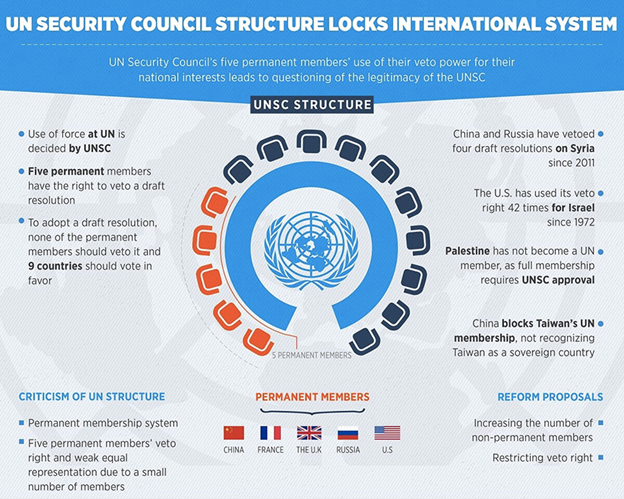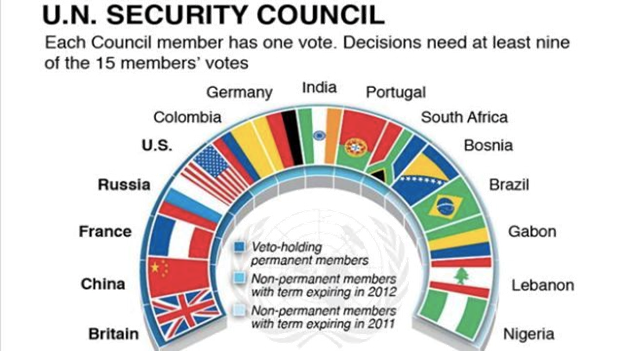UN Security Council reform is a song in a loop
Relevance
- GS Paper 2 Important International Institutions, Groupings & Agreements Involving India and/or Affecting India’s Interests, Effect of Policies & Politics of Countries on India’s Interests.
- Tags: UNSC, #UNSC Reform, #Chaalenges of UNSC.
Why in the news?
More than three decades after the debate first started over fundamental reforms at the United Nations (UN), the issue appears to have resurfaced at the ongoing General Assembly session of the world body.
- Today, there are 193 member-states of the UN, and only 15 members of the Council — fewer than 8%.
- The one change ever made to the original Charter was in 1965 when the Security Council was expanded from 11 members to 15 by adding four more elected non-permanent members.
- So, many more countries, both in absolute numbers and as a proportion of the membership, do not feel adequately represented on the body.
Issues with Regard to UNSC
Lack of Adequate Representation
- The UN Security Council is less effective because it is less representative, the most pertinent absence being that of Africa, a continent of 54 countries.
- Current global issues are complex, and interconnected. Lack of representation of geopolitical and geo-economically important countries is leaving out a large segment of global opinion to have a voice in the highest security summit.
- Furthermore, It is a matter of concern that globally important countries such as India, Germany, Brazil, and South Africa are not represented on the UNSC permanent members list.
Misuse of Veto Power
- Veto power has been always criticized by many experts as well as by most States calling it a” self-chosen club of the privileged” and non-democratic and not allowing the Council to make necessary decisions whenever it displeases any one of the P-5.
- It is also not appropriate for the current global security environment to be guided by elite decision-making structures.
Geopolitical Rivalry within P5
- The geopolitical rivalry among the permanent members has prevented the UNSC from coming up with effective mechanisms to deal with global issues.
- Taking the current world order as an example, the P5 members: United States, Russia, and China are three poles on the periphery of the globe having several geopolitical issues revolving around them (Taiwan Issue and Russia-Ukraine War).
Threat to State’s Sovereignty
- As the principal organ of international peacekeeping and conflict resolution, the UNSC is responsible for keeping peace and managing conflict. Its decisions (referred to as resolutions) are binding on all member countries, unlike the General Assembly’s.
- This means that any state’s sovereignty can be encroached upon if necessary by taking action, such as imposing sanctions.
Stances by countries for reform
- The Security Council is clearly ripe for reform to bring it into the second quarter of the 21st century. But for every state that feels it deserves a place on the Security Council, and especially the handful of countries which believe their status in the world ought to be recognized as being in no way inferior to at least three of the existing permanent members, there are several who know they will not benefit from any reform.
- The small countries that make up more than half the UN’s membership accept that reality and are content to compete occasionally for a two-year non-permanent seat on the Council.
- But the medium-sized and large countries, which are the rivals of the prospective beneficiaries, deeply resent the prospect of a select few breaking free of their current second-rank status in the world body.
- Part of the problem is that the bar to amending the UN Charter has been set rather high. Any amendment requires a two-thirds majority of the overall membership, in other words 129 of the 193 states in the General Assembly, and would further have to be ratified by two-thirds of the member states.
- Ratification is usually a parliamentary procedure, so, in other words, the only ‘prescription’ that has any chance of passing is one that will both persuade two-thirds of the UN member-states to support it and not attract the opposition of any of the existing permanent five — or even that of a powerful U.S. Senator who could block ratification in Washington.
Solution of the issues
Democratization of UNSC
- The power imbalance between the P5 and other countries in the UNSC needs to be addressed urgently to make the council more democratic and increase its legitimacy in governing international peace, security and order.
Expansion of UNSC
- The changing needs of global governance for peace and security require significant reforms in the UNSC, including expanding its permanent and non-permanent seats to better address the complex and evolving challenges to international peace and security.
Equitable Representation
- Equitable representation of all the regions in the UNSC is critical to decentralizing its governing power and authority over nations.
- The decentralization of the UNSC’s decision-making processes will enable its transformation to a more representative, participatory body.
India’s Role
- India as the current one of the non-permanent members of the UNSC can start by drafting a resolution containing a comprehensive set of proposals for reforming the UNSC.
- In September 2022, India made a push for UNSC reform, hosting a meeting of two separate groupings – G-4 and L-69 – in New York on the sidelines of the UN General Assembly.
- As India leads the Global South, it needs to revitalize its engagement with its traditional partners in the “global south” by articulating their peace and security concerns in the UNSC.
Source: The Hindu
Mains Question
What are the current issues which is leading to the UNSC Reform and also Discuss the role of India in implementing the reform of UNSC.





